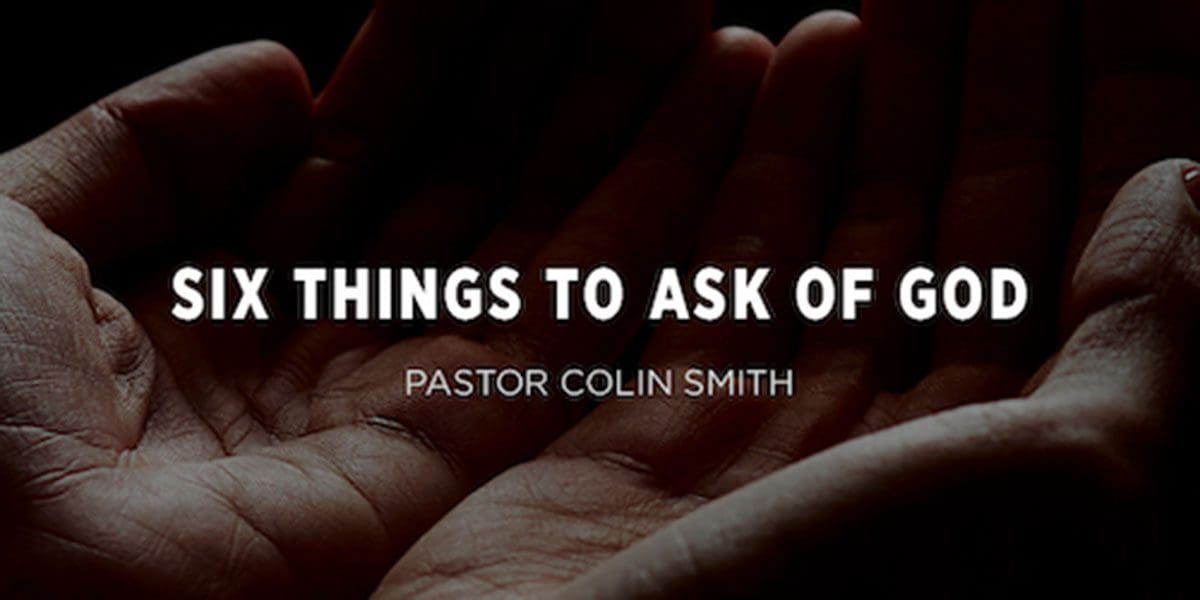Create in me a clean heart, O God, and renew a right spirit within me. (Psalm 51:10)
We begin where we ended last time with the prayer of Solomon’s father, David. The word create means to bring into existence something that was not previously there. There’s more here than David asking to be forgiven. He already asked that of God: “Purge me with hyssop and I shall be clean; wash me, and I shall be whiter than snow” (Psa. 51:7). David had already asked for forgiveness and he had received it.
But now his prayer moves on. “Lord, thank you for forgiveness. Thank you for cleansing. But now I need to ask you for something else. I did what I did because my sinful heart wanted to do it. And if you simply forgive my sin, but leave my heart in the same condition as it was before, it won’t be long before I go and do the same thing all over again.”
“So Lord, I need more than forgiveness. Create in me a clean heart, O God! Bring into existence what I do not have – a clean heart, a heart that loves you more than the sin you have just freely forgiven.” That is where we ended last week.
Today I want to ask the question: Where do you go from here? Here you are a forgiven sinner. Here you are a true Christian, and you have been given a new heart. You love the Lord. What does the path of wisdom look like for you going forward?
The message last week was primarily to those who are tempted to give up the faith they once professed. That, as we saw, is what Rehoboam did. But today I want to speak to all of us who would say, “I have Jesus Christ as the Lord and Savior of my life. I love him. I trust him. My hope is in him. Now where do I go from here?”
I want us to focus today on the six words of verse 26, “My son, give me your heart,” or as we could equally say, “My daughter, give me your heart.” Last time, we heard these words primarily as the words of a father to a son. Today, I want us to hear these are the words of God to us, his own children: “My son, my daughter, give me your heart!”
Four Observations
1. An Established Relationship
My son, give me your heart. (Proverbs 23:26)
The one who gives his or her heart to the Lord is not a stranger, not an enemy, and not a slave. The one who gives his or her heart to the Lord is described here as a son. This goes to the heart of the dynamics of the Christian faith. The giving of your heart comes out of the knowledge of an established relationship.
The point here is not: If you give God your heart, you will become his child. The point is: If you are God’s child, you will give him your heart. “My son, give me your heart.”
Our Lord told a story about a prodigal son who wasted his life in wild and reckless living, but then came to his senses and returned. Before he got home, he had already decided what he would say: “Father…I am no longer worthy to be called your son. Treat me as one of your hired servants” (Luke 15:19).
When the son got back, he only made it half way through what he intended to say, “Father, I am no longer worthy to be called your son…” But the father breaks in before he can get to the part about being a servant: “Bring the fattened calf…and let us eat and celebrate. For this my son was dead, and is alive again; he was lost, and is found” (15:23, 24). You are my son!
But there was another son and he was the opposite of reckless. He was hardworking, dutiful, and reliable. Every day he went out into the field and worked for his father. And when his “no good brother” was received with a lavish welcome, he was not happy. It seemed unfair.
So he says to the father, “Many years I have served you, and I never disobeyed your command” (15:29). And the father said to him, “Son, you are always with me, and all that is mine is yours” (15:31).
Here is a son who thinks of himself as only a servant, only as someone who does work. If you only think of yourself as God’s servant, as only someone who works for God, you will feel that he owes you for what you have done and you will not give him your heart. If you only think of yourself as God’s servant, you will find yourself asking: Am I getting what I deserve?
But you are more than a servant. Paul says, “You did not receive the spirit of slavery…but you have received the Spirit of adoption as sons, by which we cry, ‘Abba! Father!’” (Rom. 8:15). “You are no longer a slave, but a son, and if a son, then an heir” (Gal. 4:7).
It’s the knowledge of the relationship that leads to the giving of the heart.
Father God I wonder how I managed to exist without
the knowledge of your parenthood,
and your loving care.
But now I am your child, I am adopted in your family
And I will never be alone, cause
Father God you’re there beside me. [1]
“My son, give me your heart.” When you know that you are a dearly loved child of God in Jesus Christ, that is what you will do. You will give your heart to the Father who loves you.
2. An Essential Priority
My son, give me your heart. (Proverbs 23:26)
Your heart, as a Christian, is like a walled city with enemies on the outside. There are all the temptations of the world, the flesh and the devil that come from outside. These are like enemies outside the walled city, and you need to guard your heart against them. Keep the gates closed to anyone or anything that would lead you on a destructive path.
But when you have done all that, there is another side to the problem. Your heart has enemies on the outside and traitors on the inside! Because you live in the flesh, something within you is drawn to sin. So you need to guard against the traitors in your own heart! How do you do that?
Notice, these verses identify temptations that are all around us. Verse 27 speaks about the lure of sexual temptation. Verses 20 and 21 speaks about drinking, gluttony, and laziness. How, as a Christian believer, are you to guard your heart against temptations like these?
The Bible tells us the story of Joseph, a young man who had been badly treated, and was now living in another country, far from his family and from everyone who knew him. He was anonymous. He worked for a man named Potiphar, and Potiphar’s wife tempted him.
When this happened, Joseph said, “How then can I do this great wickedness and sin against God” (Gen. 39:9). “I couldn’t do that to God!” None of Joseph’s brothers would have said that. They had been brought up in the same home. They had been taught the same faith, but their hearts were not given to the Lord.
Joseph lived in what the Bible calls “the fear of the Lord.” It’s a theme that is repeated often in Proverbs. “Let not your heart envy sinners, but continue in the fear of the LORD all the day” (Prov. 23:17). “The fear of the Lord” means to so love God that his frown would be your greatest dread and his smile would be your greatest delight.
Joseph knew that God is great in his power and great in his love. His heart was given to the Lord, so he says, “How could I do this great wickedness and sin against God?” Giving your heart to the Lord is your best defense against sin.
Christian young person, what do you think will keep you from the lure of drink and drugs and sexual temptation, when these things tug at your heart? What will be stronger than the peer pressure around you when you are living on a college campus and others are giving themselves to these things? Your best defense against sin is to give your heart to the Lord.
Christian business person, what will keep you faithful, as you move from city to city, from hotel to hotel, anonymous and often lonely? Common sense? Will power? Enlightened self-interest? Your best defense against sin is to give your heart to the Lord.
Wounded Christian, what will keep you from sliding into bitterness, self-pity, and ultimately hardness of heart? What will keep you from that? Self-discipline? A sense of duty? Your best defense against these horrible, ugly sins is to give your heart to the Lord.
“My daughter, my son, give me your heart!” God is calling us to do something today that is going to make a difference to the trajectory of our lives this week. Giving your heart to the Lord is ultimately the only way to guard you from the reckless life that breaks the boundaries and leaves you with the miserable fruits of impurity and indulgence.
Giving your heart to the Lord is ultimately the only way to guard you from a shriveled life that lives within the boundaries, but leaves you miserable, because you only stayed there out of fear and caution. “My son, give me your heart!”
Where would your sinful heart lead you this week if you did not place it in the hands of Jesus Christ today? The only safe place for your heart is in the hands of the Savior. “My Son, my daughter, give me your heart.”
3. An Intentional Response
My son, give me your heart. (Proverbs 23:26)
We saw last time, your heart is the command and control center of your life. The inclination of the heart sets the trajectory of the life. So where your heart is today tells you where you will be tomorrow.
Woody Allen famously summed up where our culture goes with this particular truth. He said on one occasion, “The heart wants what it wants.” In other words, “The heart controls the life and there is nothing you can do about it.”
But I want you to notice, against that cultural background, God says to his children, “Give me your heart.” Then he says, “Direct your heart in the way” (23:19). As a child of God, you have a responsibility for your own heart. Direct your heart in the way. Give me your heart.
The world says, “The heart controls the life and there is nothing you can do about it. You just have to go with the flow.” But God says, “The heart controls the life, so give it to me!” If you are a child of God, you have the ability to do this. And if you are truly a child of God, this is what you will do.
As you give your heart to God, what is he going to do with it? He will fill it. He will fill it with peace: “Since we have been justified by faith, we have peace with God” (Rom. 5:1). He will fill it with joy: “We rejoice in the hope of the glory of God” (Rom. 5:2). He will fill it with love: “God’s love has been poured into our hearts through the Holy Spirit” (Rom. 5:5).
But most of all, God will fill us with himself. Paul prays that God may strengthen you with power, through his Spirit, in your inner being, “that Christ may dwell in your hearts through faith” and “that you may be filled with all the fullness of God” (Eph. 3:16, 19).
Give your heart to God and he will fill it! At this point someone may say, “My heart is already given. I have given my heart to my wife, my husband or my children.” If you are going to love another person really well and do it over the long-term, your own heart needs to be filled. So who will fill it? You may say, “The person I love is going to fill it.”
But here is where that leaves you: “I will love you as long as you are loving me. But if you are no longer able to fill me, I may not be able to fill you.” There is no stability and nothing that will last very long on that basis. It’s the fastest route to the end of a marriage.
The best way you can love others is to give your heart to the Lord and he will fill it. When the Lord fills your heart with his love, his peace, and his joy, you will have something to give to others, even if you are receiving very little in return.
Maybe some of you are thinking today, I don’t know if I have the capacity to love others. I don’t know if I can do it. The more you give your heart to Jesus Christ, the better you will be able to love others.
4. A Glorious Invitation
My son, give me your heart. (Proverbs 23:26)
Think about who is saying this. It is the King of kings and it is your loving Father in Jesus Christ. Your heart will be given somewhere. If you do not give your heart to God, you will give it to something or to someone else.
The question for every one of us is: Who will receive the gift of your heart? Where will you lavish your affection? You might give your heart to your work, to your family, or to yourself. You might give your heart to some cause. Whatever you give heart to, it will have a growing importance in your life.
Every heart is given to something or someone. People who don’t give their hearts somewhere else often turn in on themselves and sometimes end up giving their hearts to despair: “I turned about and gave my heart up to despair over all the toil of my labors under the sun” (Eccl. 2:20). Here is a sad person, a discouraged person. He is looking at his life’s work and he doesn’t like what he sees.
Don’t give your heart to despair. Give your heart to Jesus! The Lord says to you today, “Give me your heart.” So what would compel you to give your discouraged, tired, drained heart fully and freely to the Lord Jesus Christ today?
Remember who it is that says, “Give me your heart”? This is the call of a wise and loving father: “My son, give me your heart.” Knowing the love of the one who calls you will lead you to give your heart fully and freely to Jesus Christ. If you carry a lurking suspicion in your heart that God has it in for you, you will hold back from giving him your heart, because you will be afraid of what he might do with it.
You think to yourself: God is just. And justice means that God must punish sin. And we know that even at our Christian best, we are sinners. If you think like that, even a little bit, you will feel that safety for you lies in keeping at a distance from God.
But here’s why you can feel completely safe in giving your heart to God: God has already dealt with all your sin at the cross. Justice has already been satisfied, in Jesus Christ, so that God is free to pour out and lavish his love on you for all eternity. And he says to you, “Here is what I want you to do today, my son, my daughter, give me your heart!”
Prone to wander, Lord, I feel it, prone to leave the God I love
Here’s my heart, O take and seal it seal it for thy courts above. [2]





